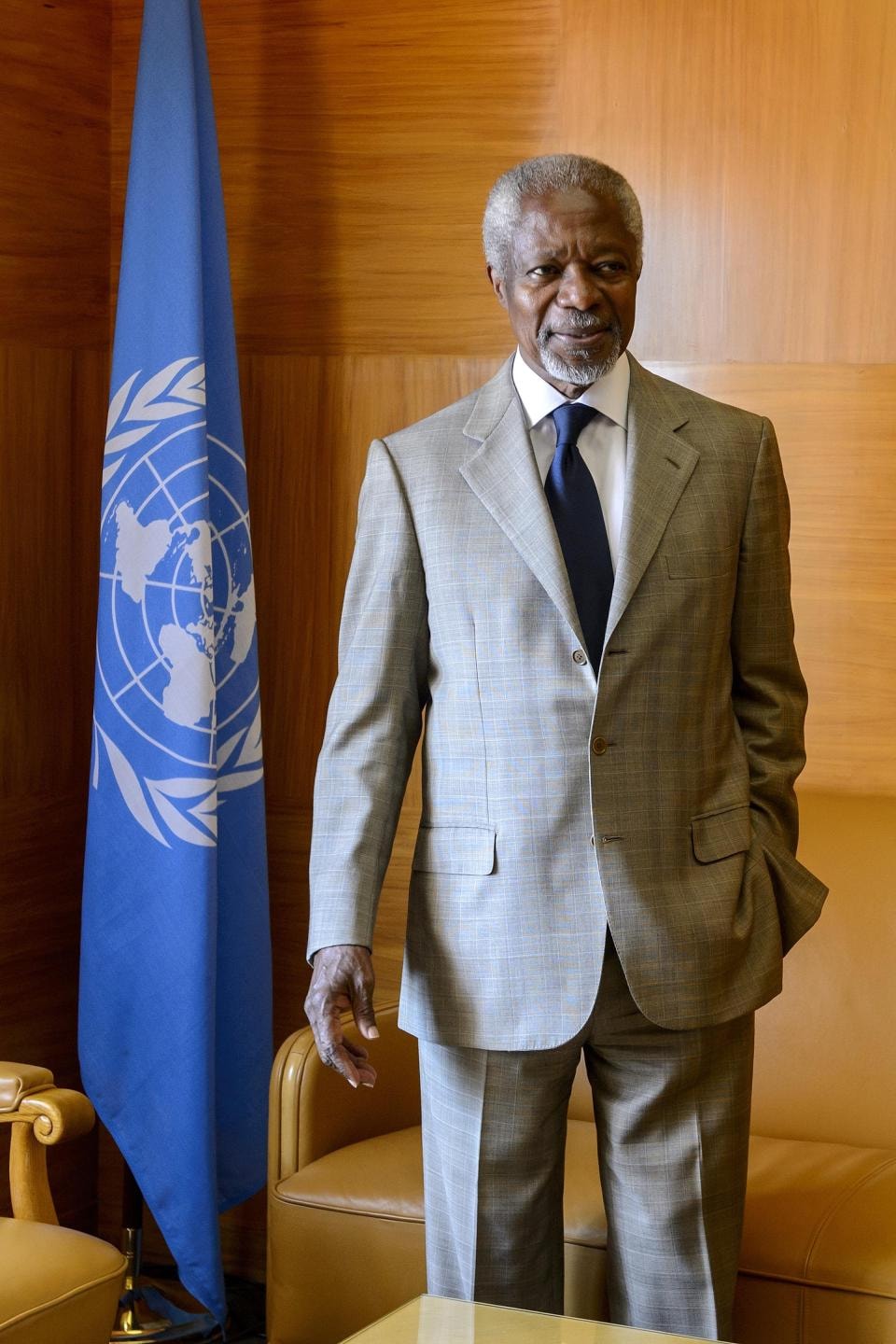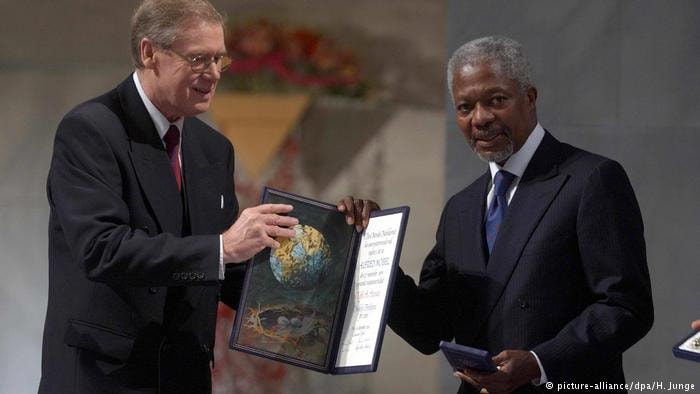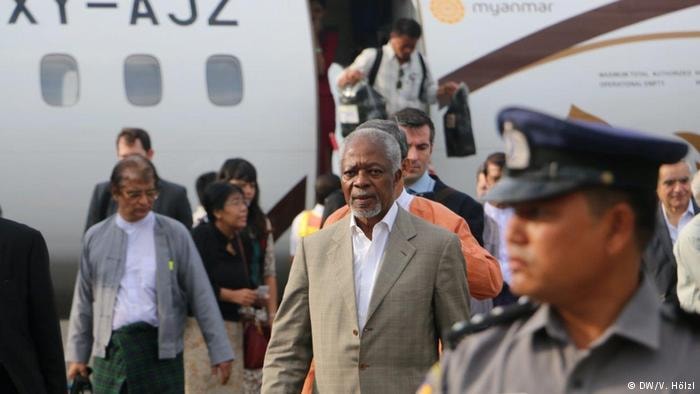Kofi Annan - the most outstanding leader of the United Nations
(Baonghean) - On the morning of August 18, 2018, former United Nations Secretary-General Kofi Annan passed away at the age of 80. The world will forever remember him - the man who devoted his life to fighting for a more peaceful and just world, and the man whom the United Nations considered the most outstanding Secretary-General in the history of the world's most powerful organization.
The talented negotiator
Kofi Annan was born on April 8, 1938, into a family of great ancestry in Kumasi, Ghana. Both his paternal and maternal families had patriarchs, with his father serving as Governor of Ashanti Province during the British colonial period.
 |
| Kofi Annan - The most outstanding Secretary General in the history of the United Nations. Photo: The Sun |
During his youth, his family's financial situation allowed him to attend the most prestigious schools in Ghana, before entering the University of Science and Technology in the capital city of Kumasi.
But not long after, 20-year-old Kofi Annan won a Ford Foundation scholarship to study economics at Macalester College in Minnesota, USA.
After receiving his bachelor's degree in economics in 1961, he went to Geneva, Switzerland to continue his studies in international relations. Later, he also studied management at the University of Massachusetts in the United States.
Considered to be a well-educated person with a special passion for international relations, Kofi Annan joined the United Nations very early, first as an accountant at the World Health Organization (WHO) in 1962, then moved to serve at the Economic Commission for Africa in Addis Ababa (Ethiopia) specializing in development projects.
In 1974, he went to Cairo, Egypt, as a personnel officer in the United Nations Emergency Force. From 1976, he worked at the Office of the United Nations High Commissioner for Refugees in Geneva.
He continued to work in many different positions, but it was not until the 1990s that the name Kofi Annan began to gain world attention for his negotiating skills in the 1990 Gulf War.
At that time, Mr. Annan persuaded Iraq to release 900 UN staff and thousands of foreigners held hostage in Iraq, and to bring them safely out of the Islamic country. Annan's next success was when he smoothly transferred the peacekeeping mission in Bosnia-Herzegovina from the UN to NATO.
 |
| Mr. Kofi Annan received the Nobel Peace Prize in 2001. Photo: DW |
In 1993, Mr. Annan was nominated by Secretary-General Boutros Ghali to hold the highest position in the organization's peacekeeping force, taking command of 70,000 military and civilian personnel from 77 countries around the world.
And when Mr. Boutros Ghali left office, Kofi Annan was elected by the General Assembly as the 7th Secretary-General of the United Nations at the end of 1996.
In addition to being fluent in English, French and several African languages, Mr. Kofi Annan possesses the excellent qualities of a leader of the largest global organization: skillful, courageous, moderate, soft-spoken, rich in ideas and full of compassion.
Friends and colleagues remember him as a man who always had a smile on his face, a man who always kept his composure and composure amidst the whirlwind of world politics.
And it is that calmness and composure that is the strength that helps him find many solutions to the most difficult problems, in the most complex areas during his 10 years as head of the United Nations.
Desire for peace
However, Kofi Annan’s career has not always been “rose-filled”. As head of the UN peacekeeping force, he was widely criticized for failing to end the Rwandan genocide, in which more than 800,000 ethnic Tutsis were killed between April and July 1994.
Mr. Annan was criticized for not deploying enough forces to the country despite warnings about the escalation of violence in the country. Later, Kofi Annan could not forget this incident as a sad milestone in his career when he said: "The international community failed in Rwanda, which left us with sadness, regret and bitterness."
But perhaps the events in Rwanda will always be a reminder when he becomes the Secretary General of the United Nations later. In his inauguration speech, he clearly stated that he does not just want to carry out administrative tasks in the office in New York, but his greatest desire is to make the United Nations work more and more effectively for peace and for a better life for people.
“The world today spends billions of dollars preparing for war, so shouldn't we spend a billion or so dollars preparing for peace?”
During his two terms as UN Secretary-General, he actively called on developed countries to help poorer countries eliminate poverty and inequality, promoted the campaign against global warming, pushed back HIV/AIDS and resolved political crises, notably the international campaign to prevent violence in East Timor and seek peace in the Middle East.
His greatest achievement over his two terms was the creation of the United Nations Millennium Development Goals, which for the first time set global targets for issues such as poverty and child mortality.
For his contributions, Mr. Kofi Annan and the United Nations were honored with the Nobel Peace Prize in 2001. And the role of "messenger of peace" still followed him even after he left the position of Secretary General of the United Nations in 2006.
With the experience and passion he pursued from his young years, Kofi Annan continued to work for various NGOs, including his own Kofi Annan Foundation.
Kofi Annan became a negotiator between the government and the opposition in Kenya after the conflict-torn elections in late 2007, served as the UN special envoy for Syria in 2012, and advised a commission to resolve the conflict with Myanmar's Rohingya minority in 2017…
“He provided space for dialogue, a place to solve problems, and a path to a better world. In turbulent times, he worked tirelessly to bring the values of the United Nations Charter to life.”
Unfulfilled wish
Considered the most outstanding Secretary General in the history of the United Nations, with many contributions to world peace, there are still wishes that Mr. Kofi Annan has not been able to fulfill when leaving the position of Secretary General.
Since taking office, he has begun promoting a new doctrine of international intervention, which places the international community's responsibility in preventing genocide and war crimes.
The idea arose from his opposition to NATO’s intervention in Kosovo in 1999 without the approval of the UN Security Council. Had the Security Council approved the operation, it would have been unlikely to have taken place, as Russia would have almost certainly vetoed it. But despite his efforts, diplomatic skills, and charisma, he was unable to establish the new mechanism.
And that was also the reason why he could not stop the US and its allies from attacking Iraq in 2003. When US President George Bush launched the attack, Mr. Kofi Annan was extremely disappointed and called it "my darkest moment".
 |
| Mr. Kofi Annan went to Myanmar to carry out his last international mission before passing away. Photo: DW |
Analysts consider Kofi Annan to be one of the most prominent representatives in enhancing the role of the United Nations since the beginning of the 21st century through efforts to promote a doctrine of international intervention to expand the scope of humanitarian assistance and protect civilians.
But as someone who has worked for many years at the world's largest multilateral organization, he understands the limitations of the United Nations when the word "peace" is decided too much by powerful countries in the organization.
That is also the reason why his international intervention doctrine has not yet received consensus. And perhaps, reforming the United Nations and enhancing its role in protecting civilians will still be a long road that Kofi Annan wants his successors to continue.

